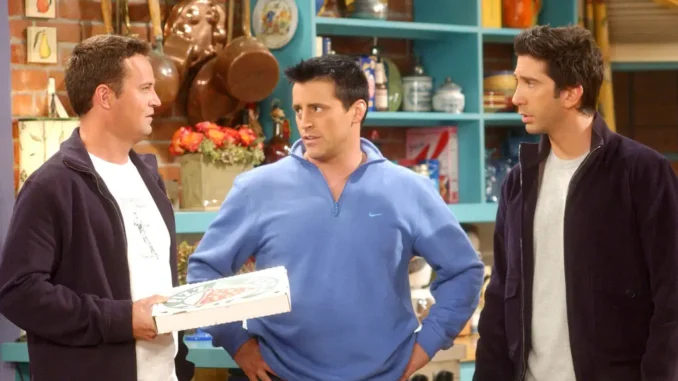
The First of Our Friends to Go
What do we mourn when we mourn a TV companion?
If you’re lucky to live long enough, eventually you get The Call. Sometimes it’s an actual call, sometimes a social media post or a conversation on the street. But the message is the same: A friend of your youth has died.
The death of Matthew Perry was sad for all the reasons it is sad when a gifted, nimble, charming performer who has shared his struggles dies too young. But it was deepened by the particular relationship of “Friends” to its audience. If you connected with the show the way the show wanted to connect with you, the weekend’s news was a global version of The Call.
“Friends” never set out to teach anyone about life and death. To its credit, it didn’t take itself seriously. (Leave that to a TV critic.) But it knew what it was. As co-creator David Crane described it, it was “about that time in your life when your friends were your family.”
In many ways its six young adults were closer than family. (Asterisk for Courteney Cox’s Monica and David Schwimmer’s Ross, who were siblings.) Their family bonds were complicated, their parents often remote or absorbed in their own business. Together, they formed a kind of alternative family; Individually and in pairs, they explore alternative ways of creating families, including surrogacy and adoption.
The show was also categorized when it premiered as a Gen X sitcom. (This was 1994, the year of “Reality Bites” and Kurt Cobain’s suicide, during the brief period when all of pop culture was trying to get a piece of the generation before forgetting about it.) This hook, like the tenure of Marcel the monkey, fortunately did not last.
Instead, “Friends” became a show about the first decade of adult life. This may be part of the reason it found a perpetually renewing audience among Millennials, who found it in syndication, and Gen Z, who found it streaming. It was about something everyone in any era understands: beginnings.
If you were, like me, roughly the same age as the cast, you saw the characters go through milestones of life as you did. If you watched it 20 years later as a preteen, it was a form of practice adulthood. It was sweetened to go down easy — the impossibly vast Manhattan apartments, the copious leisure time — and it was optimistic. Someday you could be like this, on your own but not lonely. Your job might be a joke, you might be broken, your love life D.O.A., but it would get better. You and your friends will make it better.
Every beginning implies an ending, and on sitcoms that ending usually remains implicit. The “Friends” finale, in 2004, left the characters at the end of the beginning, getting married, having kids, moving away. Even if you watched as a kid, you probably knew this didn’t mean happily ever after. But the show at least allows you to imagine things going upward from there, however rough the start.
This was true for Matthew Perry’s Chandler in particular. You met him as young, sharp and sarcastic. He was funny, but he was hardly happy-go-lucky — that was Joey (Matt LeBlanc). He was unlucky in love. He hated Thanksgiving because that was the day his parents announced their divorce when he was 9.

Editors’ Picks
Permanent Lettuce: A Pageant of Hockey Hair
A 20-Year-Old Transcriber Is Turning Sheet Music Into Hot Content
It’s Never Too Late to Find a New Career (a Mile Above Your Old One)
A lot of actors could have played him as a sardonic quipster. But Perry gave him a melancholy tinge. He was a bit of a broken toy, not unlike Perry, not unlike a lot of people. This may not have made you love Chandler more than the other Friends, but you loved him differently.
Still, he wasn’t bitter; he wasn’t defeated. And eventually he became happy, or his version of it. The series ended with him and Monica married, adopting two babies and moving to the suburbs. If he was not entirely fixed, he had at least patched up the cracks.
“Friends” thankfully never gave in to the lucrative offers to stage a revival like “Frasier” and many other sitcoms. Its episodes were fixed in time, like the pages of a yearbook. The real-world updates came like occasional notes on Facebook, sometimes happy, sometimes concerning. There was a reunion in 2021, where Perry appeared with slurred speech that he attributed to dental surgery and reminisced tenderly with his castmates.
Then came The Call. It was Matthew Perry who died; you can still imagine any ending you want for Chandler. But especially when a series invites you to grow up with its characters, it’s never so simple to untangle these parasocial bonds. You love the character, you love the performer, you love what the performer makes you feel through the character. Chandler may be fictional, but the connection is real, so the loss is real.
